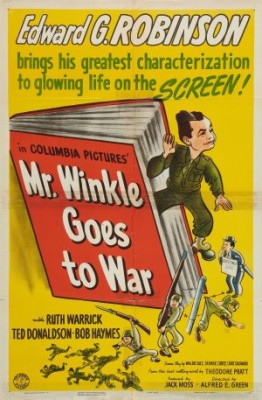| Reviews & Columns |
|
Reviews DVD TV on DVD Blu-ray 4K UHD International DVDs In Theaters Reviews by Studio Video Games Features Collector Series DVDs Easter Egg Database Interviews DVD Talk Radio Feature Articles Columns Anime Talk DVD Savant Horror DVDs The M.O.D. Squad Art House HD Talk Silent DVD
|
DVD Talk Forum |
|
|
| Resources |
|
DVD Price Search Customer Service #'s RCE Info Links |
|
Columns
|
|
|
Mr. Winkle Goes to War
A manufactured-on-demand title from Sony under its "Choice Collection" label, the black & white Mr. Winkle Goes to War gets an excellent full-frame transfer. No extras.
In June 1942, mild-mannered Wilbert Winkle (Robinson) quits his steady but unrewarding job at the local bank in order to pursue a lifelong ambition. He intends on opening a fix-it business using the workshop adjacent to the home he shares with his attractive, younger wife, Amy (Citizen Kane's Ruth Warrick). He enlists young orphan Barry (Ted Donaldson) to be his right-hand man. Barry is moved by Winkle's faith in him to the point of tears.
Amy, however, is not pleased. Upwardly mobile and fearing she'll become a laughing stock for putting up with her husband's foolishness, she threatens to leave Winkle but he gently refuses to budge.
But then a conscription notice arrives for the 44-year-old entrepreneur. Barry is distraught but, after getting over the initial shock, patriotic Winkle becomes a team player, developing a close relationship with members of his platoon, particularly fellow oldster Joe Tinker (King Kong's Robert Armstrong), Sgt. "Alphabet" Czeidrowski (Richard Lane), and Jack Pettigrew (Bob Haymes), also an employee from Winkle's bank.
As expected, Robinson delivers an understated, emotionally authentic performance despite faintly ludicrous circumstances. Robinson was actually 50 when this was made, but he passes reasonably for a man in his mid-forties, and men up to that age were still being drafted until 1943, when most over 38 were sent home or transferred to non-combat assignments.
There's much in the picture that's not believable. The wife, played by Warrick, is overdone; it's hard to imagine Winkle and Ann ever getting together in the first place, and her equally socially-conscious brother (Richard Gaines, later a frequent judge on Perry Mason) doesn't help things.
But all of the scenes between Robinson and Donaldson, despite their potential for sentimental stickiness, work because the performances are so sincere. Ted Donaldson is unjustly one of the lesser-known child stars of his era, despite sizable, back-to-back roles in One Upon a Time (1944), this, and Elia Kazan's A Tree Grows in Brooklyn (1945). Undoubtedly Donaldson's relative obscurity is because right after these films he began starring in the eight-feature "Rusty" film series for Columbia, boy-and-his-dog children's pictures directed by, among others, John Sturges and William Castle. After Phone Call from a Stranger (1952), Donaldson apparently retired from acting.
The rest of the film is unremarkable but moves well, alternating between humanist comedy and wartime melodrama effortlessly. The picture is also amusing for its future stars in uncredited roles, most notably Robert Mitchum. It's him ordering the new recruits to strip for their medical exams. Though all we ever see is part of his back and one arm, his voice is unmistakable.
Video & Audio
Presented on a region-free DVD-R, Mr. Winkle Goes to War gets an impressive full frame transfer notable for its sharpness, rich blacks and good contrast. The mono audio, English only with no subtitle options (or even a menu screen; the movie automatically starts and restarts without one), is likewise fine. No Extra Features, unfortunately.
Parting Thoughts
Better than it sounds, Mr. Winkle Goes to War is worth seeing for Edward G. Robinson and Ted Donaldson, both excellent in this throwaway bit of wartime propaganda. Highly Recommended.
Stuart Galbraith IV is a Kyoto-based film historian whose work includes film history books, DVD and Blu-ray audio commentaries and special features. Visit Stuart's Cine Blogarama here.
|
| Popular Reviews |
| Sponsored Links |
|
|
| Sponsored Links |
|
|
| Release List | Reviews | Shop | Newsletter | Forum | DVD Giveaways | Blu-Ray | Advertise |
|
Copyright 2024 DVDTalk.com All Rights Reserved. Legal Info, Privacy Policy, Terms of Use,
Manage Preferences,
Your Privacy Choices | |||||||















